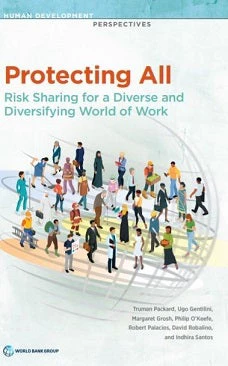 Une épicerie au Togo. Photo : © Stephan Gladieu/Banque mondiale
Une épicerie au Togo. Photo : © Stephan Gladieu/Banque mondiale
Without risk, there’s little reward. This is the gist of dozens of quotes attributable to such notable figures as John F. Kennedy and Yo-Yo Ma, Paulo Coelho and Rihanna. Their maxims on life hold true for markets. How can policy help people – particularly people living in poverty or vulnerable to impoverishment who arguably have the most to lose – take risks and reap greater rewards? For as long as there has been society, risk-sharing has been an essential clause in the social contract. However, in the present period of rapid and fundamental change, this question continues to demand the attention of policy makers.
If human capital is the most important asset in which people invest, the labor market is where they take risks seeking returns on that investment. Labor markets are also where many people experience shocks and losses. Like all markets, the labor market has imperfections and failures that motivate actions by governments to improve people’s prospects by helping them to manage risks and uncertainty as well as realize opportunities. These policy actions vary widely across countries both in form and in the combination with which they are deployed. But the objectives of most governments are similar: to ensure that the labor market is safe, fair, and a place where people’s skills, enterprise and risk-taking are rewarded. Meeting the objectives of risk-sharing policies is particularly important so that the newest entrants to the labor market—either coming fresh from full-time study or having never previously had market work—have the best chances of success.
Today the World Bank’s Social Protection and Jobs Global Practice launched a white paper “Protecting All: Risk-sharing for a Diverse and Diversifying World of Work”. The paper reflects on how global drivers of disruption such as rapid advances in technology and shifting patterns of trade are felt in labor markets in high- middle- and low-income countries, but notes that social, demographic, and climate change are also altering the nature of work.
More women are engaging in market work than ever before, broadening the set of expectations and preferences for how work is done and what prosperity means. In countries managing a youth bulge, there is a wealth of increasingly better-educated young people clustering in cities and competing for jobs, pursuing new goals and aspirations about the directions they want their career paths to take. In demographically aging countries, a clear policy imperative has emerged, to keep people productively engaged for longer portions of their lives , and a new generation of active elderly expect more choice and flexibility when deciding how to use their time. Global climate change is threatening to force, or has already forced, people to relocate to pursue their livelihoods, and it is challenging the viability of many industries and forms of work that are to seasons or particular places.
In their own way and through different channels, each of these disruptive forces is creating greater diversity and fluidity in the world of work. The problem is that prevailing risk-sharing policies -social security and worker protection- in most countries do not accommodate diversity and fluidity well. This flaw probably reflects the contexts in which these policies were conceived -the relative homogeity and stability of employment in Europe’s late industrial era - as well as the aspirations of past and present governments in low- and middle-income countries for how their economies should transform structurally and develop.
In today’s low- and middle-income countries, the world of work has long been characterized by diversity and fluidity, and that is likely to remain the case. Prevailing risk sharing policies -particularly social security, employment protection and labor regulation— assume homogeneity; that employers are effective and reliable agents of social protection; and that the employment relationship is a sufficiently stable platform on which to provide coverage to working people and their families.
The white paper argues that the mismatch between how policies assume most people work and how they actually work – and are likely to work in the future – limits the effectiveness of these interventions, and even contributes to inequitable outcomes. The present exclusion of many working people from protections is more often than not an artifact of how these protections are designed.
Greater government capacity to deliver social protection means that where and how a person works need no longer be either a de jure or a de facto obstacle to coverage. The white paper proposes a package of guarantees against poverty, catastrophic losses, and other protections that embrace diversity and fluidity; that prepare and protect working people for change. The approach we propose is more robust to the changing nature of work, and a better way for society to help people take risks, grasp opportunities and earn their stake in fast-changing economies.
RELATED
Follow the World Bank Social Protection team on Twitter: @wbg_splabor
Press Release: Social Protection Policies Must Adapt to Changing Nature of Work, says World Bank
Full Report: Protecting All Risk Sharing for a Diverse and Diversifying World of Work
Infographic: Risk-Sharing Policies in a Diversifying World of Work
Video: Rethinking Risk-Sharing Policies for a Diversifying World of Work



Join the Conversation